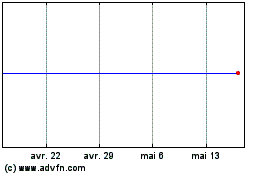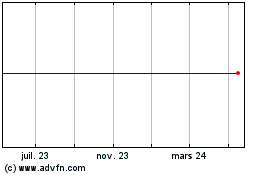Nigel Farage Resigns as UKIP Leader After Brexit Vote
05 Juillet 2016 - 3:10AM
Dow Jones News
LONDON—Nigel Farage announced his resignation as leader of the
UK Independence Party on Monday, saying he had achieved his
political ambition after his long and controversial campaign for
Britain's exit from the European Union.
The announcement marks the latest upheaval in British politics
in the wake of the country's vote to leave the EU, which triggered
the resignation of Prime Minister David Cameron and has fueled
calls for the leader of the opposition Labour Party to quit.
The referendum result and Mr. Farage's resignation raises an
existential question for UKIP, which was formed in the 1990s with
the sole purpose of getting the U.K. out of the EU and has grown in
large part due to its leader's popularity as an antiestablishment
figure. Its increasing influence—which some Conservatives perceived
as an electoral threat to their party—helped push the EU referendum
on to the political agenda.
Mr. Farage, a member of the European Parliament representing the
southeast of England since 1999, said he had never wanted to be a
career politician and his aim in politics had always been to get
the U.K. out the EU.
"During the referendum campaign I said I want my country back.
And what I'm saying today is I want my life back, and it begins
right now," he said.
Like some other onetime fringe parties across Europe, UKIP has
gained popularity in recent years among people disillusioned with
globalization and established political parties, winning 3.9
million votes—12.6% of the total—in the 2015 national elections.
UKIP has more members of the European Parliament that any other
British party.
Mr. Farage sparked anger during the campaign with suggestions
Britain could see a rise in sex crimes by migrants if it stayed in
the EU and for a provocative campaign poster showing a line of
Middle Eastern-looking migrants above the slogan, "Breaking point:
The EU has failed us all." The poster was unveiled hours before a
pro-Remain Labour lawmaker was killed in a gun-and-knife
attack.
He has denied claims his party is racist, saying an
Australian-style points-based migration system based on the skills
the U.K. needs would be fairer to minorities than the current
system that allows all EU citizens in automatically.
Mr. Farage declined to comment on who might succeed him, but
said the future of the party, which he has presented as
representing the working class, lies in exploiting turmoil in the
Labour Party.
UKIP was sound financially but it needed some reform of its
structures and professionalism, he said, without giving
details.
Mr. Farage doesn't hold a seat in the U.K.'s Parliament. The one
member of his party who does, Douglas Carswell, responded to Mr.
Farage's announcement with a smiling-face emoji on his usual
Twitter feed.
Mr. Farage briefly quit as UKIP leader in 2015 after failing to
win a seat in the national election. But within a couple of days
the party said its members had rejected his decision and he would
be staying on.
Mr. Farage said he hoped the divisions in the U.K. from the
referendum would be healed, saying the country had a brighter
future in charge of its own destiny. The U.K. now needed strong
leadership and direction as it carves out a new deal with Europe,
he said.
"We need a new prime minister who puts down some pretty clear
red lines that we are not going to give in on issues like free
movement, and we need a prime minister that will not sell us out to
what is known as the single market but is effectively a
big-business protectionist cartel," he said.
The candidates who have put themselves forward to succeed Mr.
Cameron as leader of the Conservative Party and prime minister have
said they want to reduce net migration, but haven't made clear by
how much or presented a timetable for action.
Among the three top contenders, two have said they wouldn't
trigger the formal process for leaving the EU this year and one has
said she wants to get the process moving swiftly.
The team that negotiates the U.K.'s exit from the EU should
include figures from across the political spectrum who reflect the
Brexit vote as well as people from the business community, Mr.
Farage said.
"We need to be lobbying the German car industry, the French wine
producers, because next year both France and Germany have general
elections," he said, adding, "and we need to go global."
The official group advocating Brexit kept Mr. Farage at arm's
length during the referendum campaign for fear he would alienate
some voters. But in the final weeks of the campaign, Leave
campaigners adopted UKIP's focus on immigration after starting with
a broader argument including sovereignty and economics.
Write to Nicholas Winning at nick.winning@wsj.com
(END) Dow Jones Newswires
July 04, 2016 20:55 ET (00:55 GMT)
Copyright (c) 2016 Dow Jones & Company, Inc.
Twitter (NYSE:TWTR)
Graphique Historique de l'Action
De Juin 2024 à Juil 2024

Twitter (NYSE:TWTR)
Graphique Historique de l'Action
De Juil 2023 à Juil 2024
